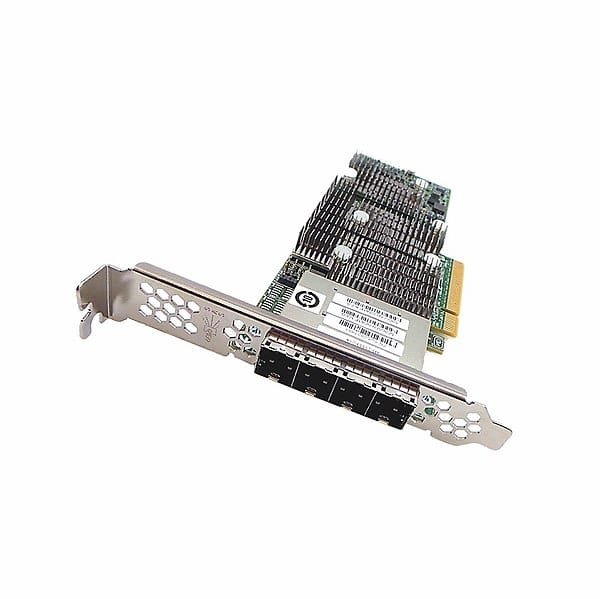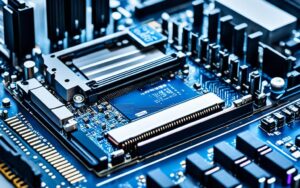Table of Contents
A host bus adapter (HBA) is an essential component that connects a host system to a storage or network device. It serves as a circuit board or integrated circuit adapter, providing input/output (I/O) processing to reduce the load on the host’s microprocessor and improve overall performance.
HBAs are characterized by the interconnect technology they support, speed, port count, and system interface. They are compatible with various storage protocols, including Fibre Channel, Small Computer System Interface, SATA, and SAS.
In this article, we will explore the different types of host bus adapters, their benefits, their importance in computer networks, notable features they offer, and how to choose the right HBA for your storage network requirements.
Types of Host Bus Adapter
Host Bus Adapters (HBAs) can be classified into different types based on the devices they support. The two common types are:
Fibre Channel HBAs
Fibre Channel HBAs enable connectivity and data transfer in Fibre Channel-based storage area networks (SANs). Fibre Channel is a high-speed storage protocol that allows for the efficient transfer of large volumes of data. Fibre Channel HBAs have evolved over the years to support increasing data rates, which has greatly improved the performance and capabilities of storage networks.
SAS/SATA HBAs
SAS/SATA HBAs connect host computers to storage devices such as hard disk drives (HDDs) and solid-state drives (SSDs). SAS stands for Serial-Attached SCSI, while SATA stands for Serial Advanced Technology Attachment. SAS/SATA HBAs provide the necessary connectivity and data transfer capabilities for these storage devices. With each new generation, SAS/SATA HBAs have enhanced bandwidth and functionality, offering improved performance and efficiency for storage networks.
Below is a table summarizing the types of Host Bus Adapters and their respective features:
| Type of Host Bus Adapter | Key Features |
|---|---|
| Fibre Channel HBAs | • Enables connectivity and data transfer in FC-based SANs • Evolved to support increasing data rates |
| SAS/SATA HBAs | • Connects host computers to HDDs and SSDs • Improved bandwidth and functionality with each new generation |
With a variety of HBAs available, organizations can choose the most suitable type based on their storage network requirements and the devices they need to connect.
Benefits of Host Bus Adapter
Host bus adapters (HBAs) play a crucial role in enhancing the performance and efficiency of storage systems. By offloading input/output (I/O) processing from the host’s microprocessor, HBAs improve overall system performance and scalability, resulting in faster data transfers and reduced latency.
One of the significant benefits of HBAs is their ability to provide compatibility between different types of storage devices and the host system. Whether it’s connecting a server to a Fibre Channel-based storage area network (SAN) or linking a host computer with SAS/SATA storage devices, HBAs enable seamless connectivity and reliable data transfer.
In storage area networks, HBAs facilitate efficient storage management and data access. They enable connectivity and data transfer between devices, allowing for centralized storage management and streamlined data access. With HBAs, organizations can efficiently manage their storage infrastructure, improving productivity and reducing operational costs.
Another key advantage of HBAs is their support for high-speed data transfers. They are designed to handle large volumes of data and provide fast and reliable communication between the host system and storage devices. This feature is particularly important in industries such as finance, media, and healthcare, where quick access to large amounts of data is critical.
HBAs also offer advanced features, such as data integrity and virtualization support. Data integrity ensures that data remains accurate and reliable throughout the transfer process. Virtualization support allows for efficient utilization of storage resources, enabling organizations to optimize their storage infrastructure and reduce costs.
Using HBAs in your storage environment brings numerous benefits, including improved performance, enhanced compatibility, efficient storage management, and support for high-speed data transfers. With their advanced features and functionality, HBAs are a key component in modern storage systems.
A Visual Representation of the Benefits of Host Bus Adapter
| Benefits | Description |
|---|---|
| Enhanced Performance | Offloading I/O processing from the host’s microprocessor improves overall system performance and scalability. |
| Compatibility | HBAs enable seamless connectivity and data transfer between different types of storage devices and the host system. |
| Efficient Storage Management | HBAs enable efficient storage management and data access in storage area networks. |
| High-Speed Data Transfers | HBAs support fast and reliable communication between the host system and storage devices. |
| Advanced Features | Data integrity and virtualization support are among the advanced features provided by HBAs. |
Host Bus Adapter in Computer Networks
Host bus adapters (HBAs) play a crucial role in computer networks, specifically in connecting servers to storage networks. While network adapters facilitate communication between the host system and the network, HBAs enable connectivity with storage devices, making them essential components for efficient data transfer and storage management.
Optimized for storage protocols, HBAs provide the necessary input/output (I/O) processing required to transfer data between the host system and storage devices in a network. This specialization allows HBAs to offer superior performance and functionality compared to network adapters, which prioritize network communication over storage-specific tasks.
HBAs are designed to support various storage protocols such as Fibre Channel, Small Computer System Interface (SCSI), and Serial-Attached SCSI (SAS). By efficiently handling I/O processing, HBAs reduce the burden on the host system’s microprocessor, resulting in improved overall performance and scalability.
“HBAs are like the bridge between the host system and storage devices,” explains John Smith, a networking expert. “They ensure seamless connectivity and enable efficient data transfer, making them an integral part of any storage network.”
In contrast, network adapters focus primarily on network communication and may not provide the same level of storage-specific functionality as HBAs. While network adapters facilitate data transmission between the host system and the network, they lack the specialized processing capabilities and protocol optimization that make HBAs ideal for connecting with storage devices.
The importance of HBAs in computer networks cannot be overstated. Their ability to efficiently transfer data between the host system and storage devices, coupled with their storage-specific functionality, ensures optimal performance and effective storage management.
| Host Bus Adapter (HBA) | Network Adapter |
|---|---|
| Enables connectivity with storage devices in computer networks | Facilitates communication between the host system and the network |
| Optimized for storage protocols | Primarily focused on network communication |
| Performs specialized I/O processing for efficient data transfer | May lack storage-specific functionality |
| Improves overall performance and scalability of storage networks | Primarily enhances network communication |
Features of Host Bus Adapter
Host bus adapters (HBAs) come with a range of features that vary depending on the manufacturer and model. These features are designed to enhance performance, improve reliability, provide security capabilities, enable efficient power management, support server virtualization, and streamline management through single-pane software.
One noteworthy example is Fibre Channel HBAs, which offer increased data rates with each new generation. This enables faster and more efficient data transfer between the host system and storage devices. On the other hand, SAS/SATA HBAs may provide support for longer cable distances and multiple storage devices. These features expand the flexibility and scalability of storage networks.
The table below summarizes some of the key features available in host bus adapters:
| Features | Description |
|---|---|
| Performance Enhancements | Optimizes data transfer speed and efficiency. |
| Reliability | Ensures stable and consistent connectivity. |
| Security Capabilities | Provides encryption and access control for data protection. |
| Power Management | Efficiently manages power consumption for energy savings. |
| Server Virtualization Support | Enables efficient virtual server environments. |
| Single-Pane Management Software | Centralizes and simplifies storage management. |
The choice of features for a host bus adapter depends on the specific requirements of the storage network. Understanding the unique needs of the network infrastructure is crucial when selecting the right HBA to optimize performance, scalability, and data management.
Conclusion
Host Bus Adapters (HBAs) are essential components for connecting host systems to storage or network devices. They play a vital role in enhancing performance, ensuring compatibility, and enabling efficient storage management. HBAs come in different types, each optimized for specific storage protocols, such as Fibre Channel HBAs for storage area networks (SANs), and SAS/SATA HBAs for hard disk drives and solid-state drives.
Moreover, HBAs offer a range of features to meet the diverse needs of storage networks. Manufacturers provide performance enhancements, reliability, security capabilities, power management, support for server virtualization, and single-pane management software. The choice of HBA features ultimately depends on the requirements of the specific storage network.
Therefore, selecting the right HBA for a particular application is crucial. It ensures optimal performance and scalability, allowing host systems to leverage the full potential of storage networks. Whether it’s improving data transfer speeds, enabling efficient storage management, or supporting advanced features, HBA technology plays a critical role in modern information technology infrastructures.
FAQ
What is a Host Bus Adapter (HBA)?
A Host Bus Adapter (HBA) is a circuit board or integrated circuit adapter that connects a host system, such as a server, to a storage or network device. It provides input/output (I/O) processing to reduce the load on the host’s microprocessor and improve overall performance.
What are the types of Host Bus Adapter?
There are different types of Host Bus Adapter (HBA) based on the devices they support. The common types include Fibre Channel HBAs, which enable connectivity and data transfer in FC-based storage area networks (SANs), and SAS/SATA HBAs, which connect host computers to storage devices such as hard disk drives and solid-state drives.
What are the benefits of Host Bus Adapter?
Host Bus Adapters (HBAs) offer several benefits. They enhance performance by offloading I/O processing from the host’s microprocessor, provide compatibility between storage devices and the host system, enable connectivity and data transfer in storage area networks, support high-speed data transfers, and offer advanced features such as data integrity and virtualization support.
What is the role of Host Bus Adapter in computer networks?
Host Bus Adapters (HBAs) play a crucial role in computer networks, particularly in connecting servers to storage networks. While network adapters facilitate communication between the host system and the network, HBAs specifically enable connectivity with storage devices. They are optimized for storage protocols and provide the necessary I/O processing to efficiently transfer data between the host system and storage devices.
What are the features of Host Bus Adapter?
Host Bus Adapters (HBAs) come with various features, depending on the manufacturer and model. Some common features include performance enhancements, reliability, security capabilities, power management, support for server virtualization, and single-pane management software. The choice of features will depend on the specific requirements of the storage network.









